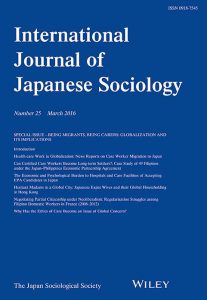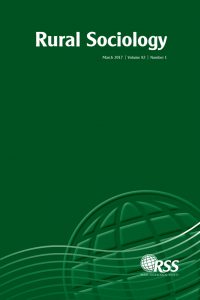Interview with Professor Byoung-Hoon Lee, Associate Editor for Sociology Compass

Sociology Compass is delighted to welcome Professor Byoung-Hoon Lee as our new Associate Editor for the Work, Organizations & Economics Section. Byoung-Hoon is Professor in the department of sociology, Chung-Ang University, South Korea. The Associate Editor role at Sociology Compass is to lead on the commissioning of state-of-the-art review articles under dedicated subject areas. We took the opportunity to talk Byoung-Hoon about his research background and aims for the work, organizations & economics section as he joins the Sociology Compass editorial team.
Please tell us about your research background and how you came to study sociology?
I obtained my MS and PhD in Industrial & Labor Relations at Cornell University and, in addition to my professor position at Chung-Ang University, have had a variety of work experiences ranging from system engineering to government policy-making and social dialogues, NPO/NGO & union activities, and as a media/press columnist. My research interests started with industrial relations and work (re)organization in the auto sector, and has over time broadened to diverse thematic areas, such as the polarization and precaritization of labor markets, industrial restructuring, union representation and workers struggles, changes in human resource management & employment relations, labor politics & social dialogue, and neoliberal economies and lean production models.
In carrying out my research work in such diverse academic areas of work sociology and labor studies, I have conducted joint projects with researchers of other sociological fields (i.e. social classes & movements, organizational studies, and economic sociology) and further participated in interdisciplinary co-working with scholars in labor economics & laws, business studies, social welfare/policy, political science, psychology, and industry/geography studies. Sociology was the very symbol of critical studies and democratic struggles which criticized and defied the authoritarian regime and neoliberal capitalism in South Korea, which attracted me to choose sociology as the field of life-long academic study.
What would you consider the most compelling or critical questions for your area of research right now?
At present, we are living in an era of great transformation, driven by digital revolution, climate crisis & net-zero regulations, an ageing society, and the global pandemic. Confronted with those mega trends, we can consider the following research inquiries:
- what impact do such transformations have over working life and labor relations, business operations and organizational structures in private & public sectors, and macro economies & industrial sectors;
- how do working people, business organizations, and public administration in the new political economies respond to challenges and threats caused by those transformations and what interplay do those actors produce;
- to what extent are changes in work, organizations, and economies converging or diverging across the globe;
- what methodological enhancement in quantitative and qualitative approaches could be applied for comprehending and theorizing the on-going transformation in work, organizations, and economies.
I want these research queries to be answered or covered by review articles in the section of work, organizations and economics.
In your view, what does sociological research contribute to society? Why does it matter?
I believe that sociological research has made significant contribution to the scientific diagnosis and practical solution of social problems, and will help tackle societal issues posed by present and future transformations. Sociological imagination, which C. Wright Mills defined as “the awareness of the relationship between personal experience and the wider society”, offers historical, comparative, and critical perspectives in sociological research to broaden and deepen the understanding of societal problems and find just solutions for social injustice. Moreover, the accumulation of sociological research sheds light on the interplay between actors and contextual settings, and provides a useful lens to find ways to manage the actors’ subjective wellbeing as well as dealing with the given social problems.
As Associate Editor for the Work, Organizations and Economics Section of Sociology Compass, what are you looking for when commissioning and assessing Review Articles?
I’m looking for topics which focus on recent transformations mentioned above which are relevant for academic communities of work, organizations and economic sociology. For example, platform capitalism, precarious labor and fissured workplaces, climate crisis and transition in industries and work, and innovative sustainability of business operations and political economies are some interesting research subjects within this section. In assessing the commissioned articles, I’m looking for thorough discussions of recent research developments in empirical analysis and theoretical debate, and how clearly review opinions are addressed with a reasonable rationale.
In addition, I want to further globalize the composition of the section review articles in searching for their subjects and authors, by going beyond the academic boundary of Western advanced economies of the Global North, and reaching the research issues of work, organizations and economics in non-Western societies of the Global South in a balanced manner.
What inspires you to be involved in Sociology Compass as an Associate Editor?
The goal of Sociology Compass, which is impressed in its homepage, is to ‘provide an ideal starting point for specialists and non-specialists to help them find and interpret the best research in the field (of sociology)’’. This goal inspires me to get involved in SoCo as an associate editor. There are a number of scholarly journals based upon a variety of sociological fields which mainly target specialists of their own academic communities. The ambition of SoCo to expand its audience to non-specialists, including students, touches me a lot, since I have a concern that sociological journals – in both domestic (South Korean) and international contexts – have focussed on specialist-centered publication, resulting in the exclusion of non-specialists from their academic discourse.
Given the SoCo’s ‘inclusive’ principle, my aims as associate editor are to encourage publication of good quality review articles not only to update specialists’ understanding, but also to inspire non-specialists interested in empirical findings and theoretical discussions concerning critical academic issues in the sociological fields of work, organizations and economics.
For readers and researchers new to your discipline, what would you put at the top of their recommended reading list?
I recommend three books for readers new to the section of work, organizations and economics:
1. The Great Transformation, by Karl Polanyi (1944)
The first is an influential classic to discuss the politico-economic transformations, which took place along with the rise of market economy and nation state in British modern history. Polanyi’s book offers a great insight into the double movements between liberal market-driven disorganized capitalism and state-regulated organized capitalism over the past century and up to now.
2. The Fissured Workplace, by David Weil (2017)
The second presents a striking picture of the restructuring of corporate business and organizations in the US. Weil’s book casts light on the fissuring of workplaces by subcontracting, outsourcing and franchising, and provides detailed evidence of the damaging impact corporate restructuring has over American people’s working life, which can be observed as true also in many countries.
3. Work under Capitalism, by Chris Tilly & Charles Tilly (1998)
The third is a well-written textbook to comprehensively explore the world of work and working people under capitalism from the institutionalist perspective. The book by Tilly & Tilly helps non-specialists and students get a good idea of how the world of work has transformed during the history of capitalism, how its diversity has increased under capitalism, and what theoretical lenses might be useful for explaining the changes and variance in the capitalist world of work. (For this reason, I translated this book into Korean in order to use it for the ‘sociology of work’ lecture).
Professor Lee takes over this Associate Editor position from Dr. Eric Dahlin, who finishes his term at the end of 2022. We’d like to thank Dr. Dahlin for his dedication and commitment to leading the Work, Organizations and Economics section over the past years. You can take a look at the articles published during this term here.





